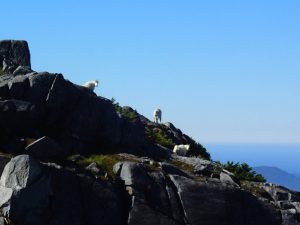UPDATE (June 16, 2017): all positions filled for this season’s research team. This is a five year program so keep an eye out for future opportunities. For potential graduate students interested in engaging with this project send me an email and consider applying to UBC’s Anthropology or Resource Management and Environmental Studies graduate programs (programs I supervise students in).
The snow is melting and the mountains beckon!
I’m seeking field crew for some alpine work in Gitxaała territory. We’re getting ready for a series of field trips and I am looking for a some people who are able to carry their weight (not literally 😉 ) on remote area field research trips. There will be three to four field trips between May & August, 2017. We are looking for 2 to 3 crew per trip.
The expertise that would be helpful include: alpine archaeology, botany (alpine and sea level), and wildlife ecology (mountain goat). Being capable of carrying all of your equipment from sea level to 1100 m elevation and then being able to walk 10-15km a day is a baseline expectation. Having first aid certification is important. Also any related outdoor expertise: Avalanche training, rock climbing skills, orienteering, GIS mapping, etc.

Our Destination!
Each trip is scheduled for 8-14 days (weather etc depending). If you might be interested in talking about this further, send me an email charles.menzies[at]ubc.ca and describe for me your experience in remote area camping, field archaeology and/or botany/wildlife ecology.
As this is part of a five year research project there are also potential opportunities for a longer term involvement for the right person (or persons) – someone who can blend the field work with a thesis/dissertation project that fits the overall project’s scope of work.
